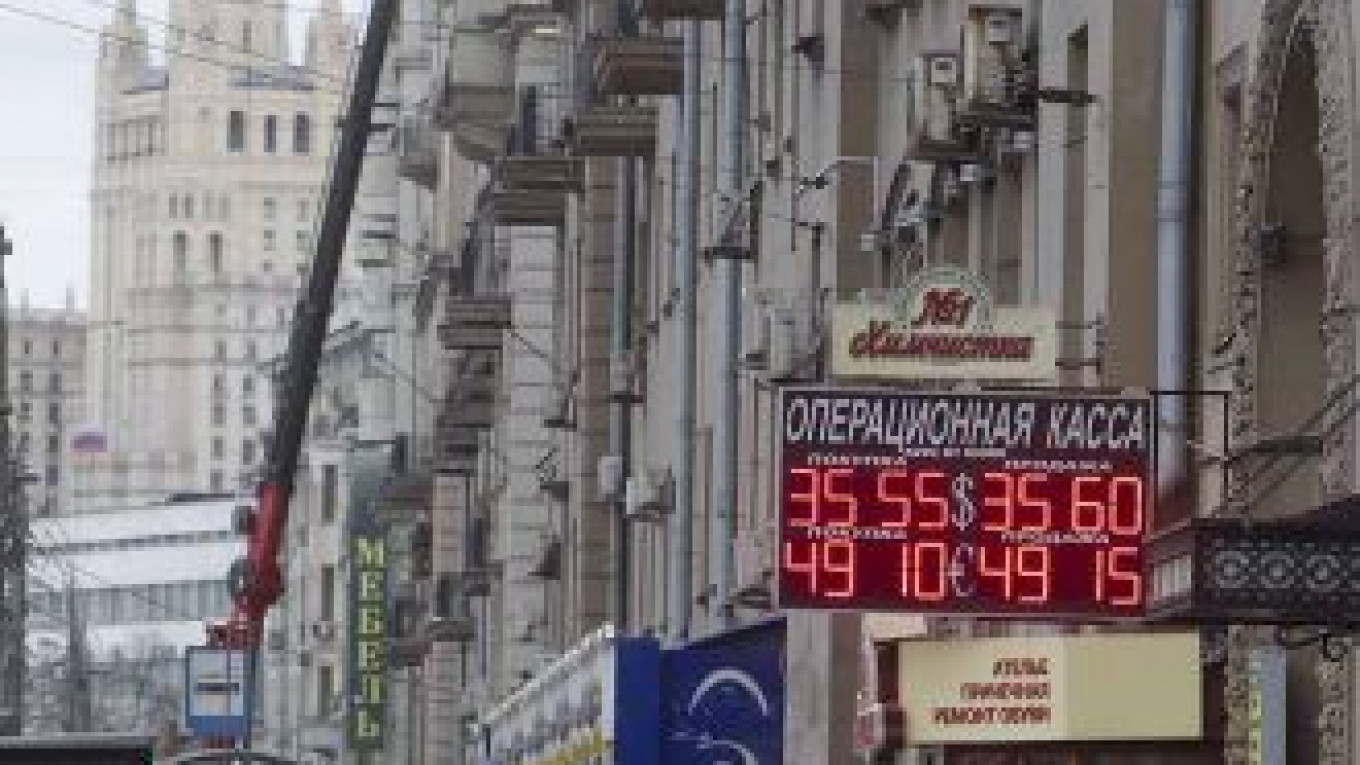The ruble hit an all-time low against the euro and fell against the dollar on Wednesday, propelled downward by the finance ministry's plans to buy foreign currency and a surge of violence in Ukraine.
Protesters poured into a central Kiev square on Wednesday, a day after at least 25 people were killed in demonstrations, causing Ukraine's sovereign bonds and currency to tumble.
Moscow shares also fell sharply, a day after the Finance Ministry announced it would buy $6 billion in foreign currency to replenish one of its sovereign wealth funds. From Feb. 20 through May, the ministry will buy 3.5 billion rubles a day from the Central Bank, decreasing the Central Bank's daily foreign exchange market interventions by the same amount. The bank has poured billions of dollars already this year into steadying the ruble, which has nevertheless sunk by 10 percent against the dollar and 9 percent against the euro since the beginning of the year as part of a global relocation of capital away from developing markets.
The ruble hit an all-time low versus the euro, sliding one percent on the day to 49.33 pulling back to 49.1 Wednesday evening on the Micex exchange. It fell 1.2 percent to 35.84 per dollar, its weakest since 2009, before recovering to 35.7.
This pushed the ruble to a fresh low of 41.9 against the dollar-euro basket the Central Bank uses to gauge the currency's nominal exchange rate. At 8 p.m. in Moscow, the ruble was at 41.73 to the basket.
Russian stocks also traded lower, with the RTS index down nearly 3 percent. The finance ministry cancelled its weekly auction of treasury bonds due to lack of demand.
In Ukraine, protests that began in November have hit the heavily indebted economy and drained the country's Central Bank of foreign reserves.
"The situation is obviously aggravating. It looks like it is just going to get worse before it gets better," said Ilan Solot, emerging currency strategist at Brown Brothers Harriman.
Russia is a key supporter of Ukrainian President Viktor Yanukovych and said Monday it would pay out a second, $2 billion, tranche of a promised $15 billion aid package to the heavily indebted economy. On Wednesday, with Ukraine still waiting for the cash, the Kremlin appeared to be backtracking on that promise as Ukraine was convulsed by violence.
Ukraine's dollar bonds on Wednesday fell across the curve. The bond maturing in 2023 hit all-time lows of 80.50.
The 2020 dollar bond lost 0.4 cents of a dollar, while 2014 bonds also fell more than 1.5 cents.
The cost of insuring Ukraine's debt for five years shot up to 1,271 basis points, the highest since December 2009, according to Markit.
Bank of America Merrill Lynch said Ukraine has total maturing debt of about $9 billion this year, out of which Ukraine would have to pay the IMF about $3.6 billion, with the main share of payments due in the first half of 2014.
The country also has to pay $600 million in interest on its external debt in the first half and its $1 billion eurobond due in June. But foreign reserves are at an eight-year low of $18 billion after the central bank has spent about 8 percent of its reserves on currency intervention in January alone.
Material from the Moscow Times was included in this report
A Message from The Moscow Times:
Dear readers,
We are facing unprecedented challenges. Russia's Prosecutor General's Office has designated The Moscow Times as an "undesirable" organization, criminalizing our work and putting our staff at risk of prosecution. This follows our earlier unjust labeling as a "foreign agent."
These actions are direct attempts to silence independent journalism in Russia. The authorities claim our work "discredits the decisions of the Russian leadership." We see things differently: we strive to provide accurate, unbiased reporting on Russia.
We, the journalists of The Moscow Times, refuse to be silenced. But to continue our work, we need your help.
Your support, no matter how small, makes a world of difference. If you can, please support us monthly starting from just $2. It's quick to set up, and every contribution makes a significant impact.
By supporting The Moscow Times, you're defending open, independent journalism in the face of repression. Thank you for standing with us.
Remind me later.






